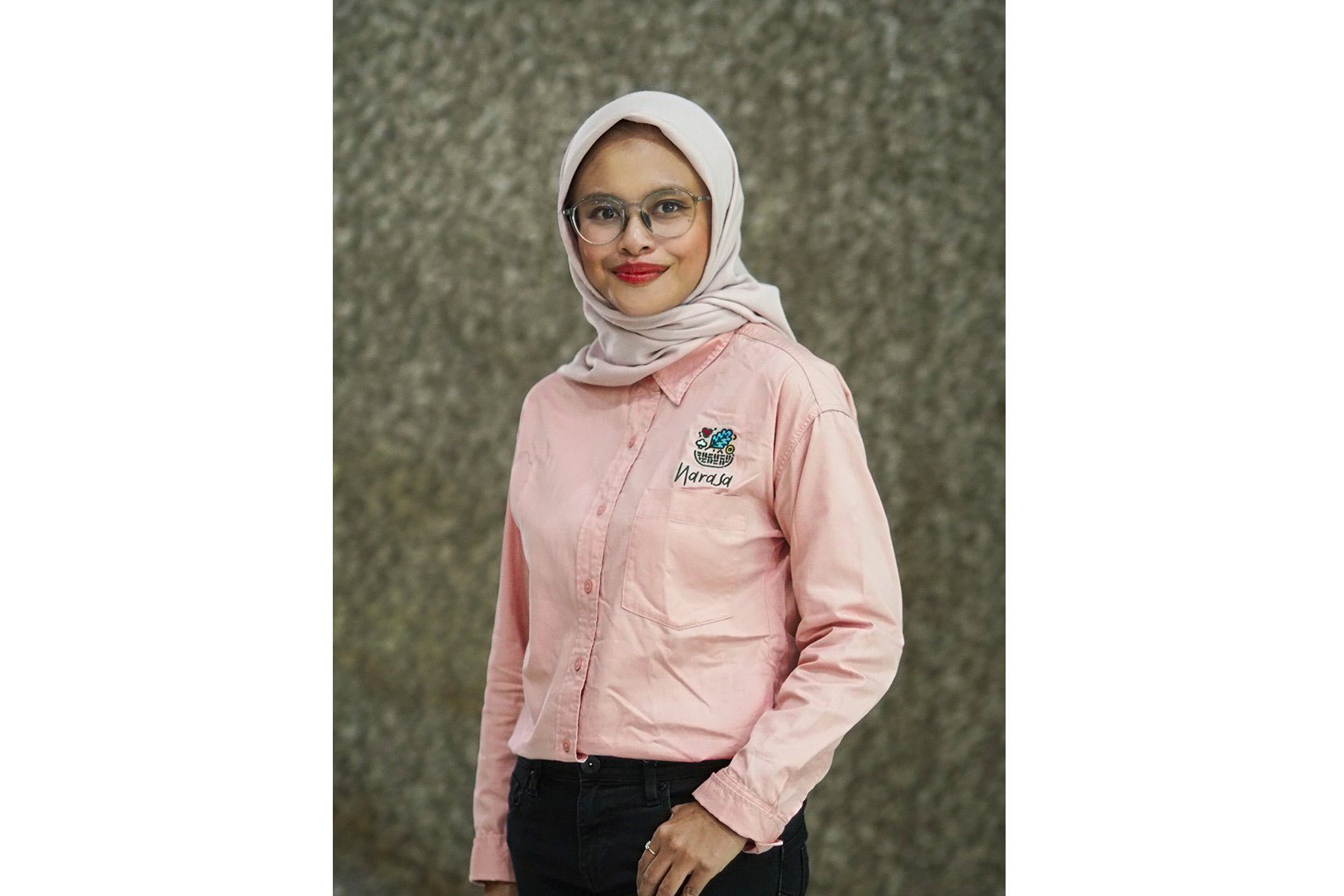As a mentor to micro, small, and medium enterprises (MSMEs) in Indonesia, Devina Sandriati sees the greater value in products that are local, unique and handmade, and helps them connect with larger markets.
In 2019, Devina founded Narasa, a food start-up concerned with food product development, producing ready-to-eat products from sorghum and modified cassava flour. Over time, she transitioned the focus of her business to marketing and branding, emphasising a community development approach in various regions across Indonesia.
She had been working in the education field, travelling throughout Indonesia, when she realised the huge number of micro-businesses run by parents. Many of them were mothers producing local snacks.
Devina saw an opportunity to provide them with training on branding and marketing, which would enable them to expand their product offerings.
‘I noticed that many of our most promising local products were being produced without a clear branding and marketing strategy. I believed Narasa could bridge this gap by imparting practical skills and knowledge to MSME owners,’ Devina explained.
Applying Australian Learning to Indonesian MSMEs
In 2020, Devina enrolled in the Australia Awards Short Course on the Australia Awards Short Course on ‘International Business Readiness - a Course for Women-led MSMEs in the Food Sector (IACEPA)’, delivered by Griffith University. The program focused on women-led MSMEs in the food sector and preparing them for the global market.
The Short Course was held online due to the COVID-19 pandemic, but Devina still had an incredibly enriching experience.
‘The student-centric mentorship in Australia's education system truly stood out to me,’ she recalled. ‘The teaching style of our mentors was different to what I had previously encountered in Indonesia. Even when providing feedback, they maintained a respectful attitude towards participants, regardless of the relevance of the questions asked.’
Throughout the course, Devina gained extensive knowledge in branding, marketing, and the business model canvas, all of which played a pivotal role in advancing her business.
While she had some familiarity with these concepts, the course provided her with refreshingly straightforward and practical insights tailored for implementation within Indonesian MSMEs. This experience inspired her to develop modules tailored to MSMEs, ensuring their alignment with the local context.
Additionally, the course offered valuable personal growth opportunities, particularly in networking and personal development. Collaborating with fellow start-up founders as course partners honed her communication skills and fostered healthy business relationships and a supportive network.
‘To this day, I maintain regular communication with my coursemates. Our relationship has flourished since the course,’ Devina shared.
Building Collaborative Communities with Narasa
After the course, Devina and her team focused on product research and development, aiming to create products that MSMEs could produce based on their local resources. Today, Narasa supports hundreds of MSMEs across Indonesia and promotes regional food products as unique and marketable commodities.
In West Sumbawa, Devina’s team has implemented a community-based program to engage both MSMEs and youth. The goal is to foster collective business growth and build a sustainable local supply chain. This community initiative, known as Silaras[1], offers souvenirs, merchandise, and design services to both domestic and international visitors.
Through Silaras, several locally designed products have been introduced. In market testing, these products have received positive responses from both residents and tourists, showing potential to contribute to the local economy.
‘We distributed the products to souvenir outlets and retail markets in West Sumbawa, including at Lombok International Airport. The response has been overwhelmingly positive, and it confirms the potential for these locally-designed products to reach wider markets,’ Devina shared.
In Pekalongan, Central Java, Narasa has supported 40 MSMEs to develop eco-friendly batik businesses, helping them become ready to participate in both online and offline markets. The focus has been on improving environmental sustainability and increasing competitiveness.
Narasa has also collaborated with Timba[2], a community maker space in Central Java, to support tuberculosis survivors.
‘Timba has the experience and capacity to serve as a facilitator and mentor in the field of crafts. We engaged TB survivors and trained them in woodcrafts, such as producing souvenirs and children’s toys,’ Devina explained.
Narasa has also supported MSME partners in Aceh, North Sumatra, and Bogor, West Java, by strengthening the supply chain and business ecosystem for jack bean products. These are processed into tempeh and other foods, offering an alternative protein source to soy.
‘Looking ahead, we hope to reach MSMEs in other cities, particularly in regions where issues around sustainable tourism and women’s empowerment are significant,’ Devina added.
Scaling Impact and Strengthening MSME Ecosystems
Since her experience in the Short Course, Narasa has gone from strength to strength. The course offered Devina invaluable networking opportunities, insights, and engagement with fellow alumni. The experience gave her the skills to make significant developments in the mentoring program for MSMEs.
In October 2020, Narasa was recognised as one of the Top 25 Food Start-ups in Indonesia by the Ministry of Tourism and Creative Economy.
MSMEs that have participated in Narasa’s programs report increased revenue and improved business capabilities. Narasa has also developed a database to monitor MSME progress and identify businesses ready to scale or export.
‘We designed the database to track the growth and readiness of MSMEs. Once they meet quality and production standards, we can connect them with broader market opportunities,’ Devina explained.
Looking to the future, Narasa plans to maintain long-distance mentoring relationships with MSMEs to ensure sustained business operations.
‘We want to continue supporting MSMEs remotely to help sustain their growth,’ Devina said. ‘In the long term, we aim to collaborate with MSME partners to create unified branding strategies that can drive local economic development across Indonesia.’



 Devina Sandriati Mentors Small Businesses to Break into Larger Markets
Devina Sandriati Mentors Small Businesses to Break into Larger Markets